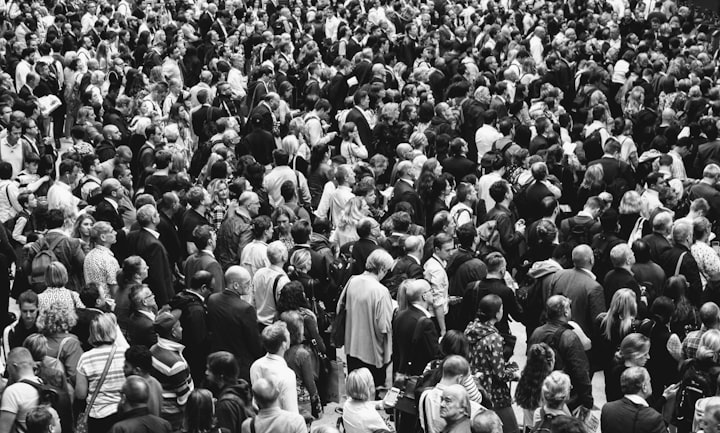Why Practicing Cultural Sensitivity Isn't Just For White People
"I can't use those words to describe that culture unless I belong to that culture…because then I can use whatever words I want right?"

I've been on the receiving end of racism and cultural insensitivity. And the worst came from someone who shared the same ethnicity and many aspects of my culture as me.
"Oh I can't say that word; it's politically incorrect."
"I better do or say this or I'll offend their culture."
"I don't use the hyphen when I identify my culture. I'm Chinese Canadian, not Chinese-Canadian."
So the other day, I was making dinner plans with my sister. She sent me some restaurant links to check out.
One of them stood out for me so I messaged her,
"Ooh let's go to that one. I've been craving Mexican."
She responds,
"Sure, we can go there but it's actually Spanish tapas."
So I have to confess that my first reaction (in my head) was:
"To-May-To…To-Mah-To."
But then, I caught myself and said,
"Right…Spanish. That was culturally insensitive of me :(."
What Does Culture Mean?
Nowadays, the word "culture" can be used to describe a group of people who share the same decade of birth (eg. those damn Millennials), a group of people who share the same ethnicity, a group of people who work together, a group of people who live in the same country and so forth.
It's such a widely used term that when I think of "cultural sensitivity", I honestly don't know where to start.
Which culture is it referring to?
Where do I stand in that spectrum? (ie. how sensitive am I?).
Culture can be thought of as "the way things are around here." 'Here' can be a physical location, ethnicity, age, gender, industry, socio-economic status, within a family…etc
And if I have to change my sensitivity levels every time I was in a different environment with different people…then basically I should go dig a hole in my yard, and stay there for the rest of my life, not saying anything to anyone in case I offend someone's culture.
But obviously, I haven't done that and I've actually been enjoying myself, spewing out my opinions and rants publicly for the world to hear.
As a society, cultural insensitivity actually cannot be prevented because it's impossible to understand everyone's culture.
Workplace Cultural Sensitivity Training
Yes, there are cultural sensitivity training courses people can take; however, most of these only scratch the surface and are often requested by an employer.
"How to be more culturally sensitive in the workplace"
More like…
"Let's make it look like our company prioritizes the development of our employees' cultural sensitivity skills so we don't wreak havoc for the HR or PR department"
- Watch this video
- Read this article
- Match these terms to their definitions
- Share something on the discussion board
- Take a quiz
- 100% course completion = my manager's off my back now
But I think cultural sensitivity is inherent to someone who practices empathy, who has a decent level of emotional intelligence and who treats others with compassion and kindness. It's taking that moment to realize when I've been insensitive, acknowledging it, taking responsibility, and appreciating the opportunity to learn and change.
From being made fun of for the shape of my eyes to being mocked for speaking a different language, I've been on the receiving end of racism and cultural insensitivity.
And yes, these incidents involved those who did not share the same culture or ethnicity as me.
Worst Experiences Come From Where It's Least Expected
However, the worst experience actually came from someone who shared my ethnicity and many aspects of my culture.
When I was 5 months pregnant, we had lunch with one of my husband's old acquaintances, a Chinese woman in her 60's who immigrated to Canada from Hong Kong over 40 years ago.
I'll call her Mabel.*
*Sounds like an older Asian woman right?
She recently retired after working for 30 years at a company that consisted of 90% white people. Mabel speaks fluent English and Chinese. She never married and does not have children.
Drawing from what I knew of her, I made assumptions about her character without ever having met her.
Bad mistake!
I didn't follow my first rule of understanding another human being:
Don't ever assume anything about anyone until I've met them and shared a beverage.
Anyway, I had expectations that Mabel was going to be this Westernized, open-minded, non-conforming, modern woman with a high degree of emotional intelligence and who understood both the Chinese and Canadian culture.
We sit down for lunch and she congratulates me on my second pregnancy. I respond graciously, glowing like an overripe Hami melon,
"Thank you so much."
Without any further small talk or conversational etiquette, Mabel bluntly asks,
"How fat have you gotten? How many pounds have you gained?"
I calmly state,
"I don't know."
She continues,
"You have to watch out because you can get gestational diabetes and that's not healthy for the baby."
I ask,
"Do you know anyone with gestational diabetes?"
She retorts, ignoring without sensing the subtle annoyance in my question,
"No, but I hear it is very common."
I'm feeling curious and courageous at this point and slightly surprised by my level of tolerance given the raging pregnancy hormones that are coursing through my blood. So I politely inquire with a slight chuckle,
"Is this a Chinese thing to ask a pregnant woman how much weight she has gained?
Because my father-in-law (gesturing to my husband) asked me the same thing."
Mabel's face turns sour, her eyebrows furrow and lips curl as she defensively snaps,
"I'm merely concerned for your health. You shouldn't be offended. You just don't understand the Chinese culture."
I snap back,
"No, I do understand the Chinese culture."
I spend the rest of the lunch focused on my daughter, catering to her every need, portraying myself as a dedicated mother while feigning very little interest in her stories condescending lessons so I could internalize what had just happened. I was angry, frustrated and disappointed. But mainly, I was deeply confused.
"Why was I so offended?"
Because she told me I "SHOULDN'T be offended."
There is a difference between understanding someone's culture and having it shoved down your throat just because you share the same ethnicity.
Ethnicity ≠ Culture
I was born and raised in Canada by my immigrant parents and although I embrace many aspects of my Chinese heritage, there are some social practices and conversational nuances that I won't ever appreciate.
They go against my Canadian upbringing that influenced and shaped the values, beliefs and morals of who I am.
When Mabel made those comments and asked those blunt questions, she offended my Canadian/Western culture just as much as I offended her Chinese culture when I questioned her "good intentions."
And I acknowledge that I offended her and I absolutely believe she has a right to feel offended.
However, she felt it was within her right to impose her culture onto me because we share the same ethnicity.
Her arrogance in dictating how I should feel (ie. "not offended") due to her grossly incorrect assumptions about me compounded by her lack of emotional intelligence is the epitome of cultural insensitivity.
However, her insensitivity ultimately stems from her ignorance in understanding the Chinese Canadian culture, something that is neither fully Eastern nor Western but a blend of practices and traditions that spans across generations of individuals who were either born and raised in Canada or came here at a young age.
Difference between Chinese Culture and Chinese Canadian Culture
One of the reasons why Mabel said what she said is because she doesn't know that there is a difference between Chinese culture and Chinese Canadian Culture.
Chinese Canadian culture isn't clearly defined. It doesn't get talked about because those who identify with this culture (like myself) don't quite understand it themselves.
It's neither a whitewashed Banana (Yellow on the outside, white on the inside) nor a FOB (Fresh Off the Boat) culture. It's a little bit of this and a little bit of that and I don't know what I resonate with until I hear or experience something that triggers me emotionally.
Raising the Chinese Canadian Voice While Practicing Cultural Sensitivity
As someone who grew up feeling lost between two cultures, it's made me incredibly aware of how my actions and words can potentially disrespect someone's culture.
I've been dancing around each culture too long, acting according to what is expected of me, depending on the environment that I am in and the people who surround me. I needed to stop convincing myself that I shouldn't feel offended when I actually am.
And it's time for me to raise awareness of what makes the Chinese Canadian culture uniquely different.
It doesn't mean all Chinese Canadians should start our own blogs, YouTube Channels, write for HuffPost Asian Voices and create a charter of their principles and what they believe in and then a course to educate others in understanding our culture (Although, that would be pretty awesome).
But rather, it's during those informal conversations where I feel triggered, taking a moment to understand why it made me feel the way it did and having the courage to say,
"I'm offended and this is why."
Cultural sensitivity isn't just for those who don't share the same culture as me. It's for everyone. However, how can I promote and practice cultural sensitivity if no one is aware that this culture exists?
So Readers, how do you define cultural sensitivity? When was a time when you experienced cultural insensitivity?
About the Creator
Katharine Chan
Sum (心, ♡) on Sleeve | Author. Speaker. Wife. Mom of 2 | Embrace Culture. Love Yourself. Improve Relationships | Empowering you to talk about your feelings despite growing up in a culture that hid them | sumonsleeve.com/books






Comments
There are no comments for this story
Be the first to respond and start the conversation.